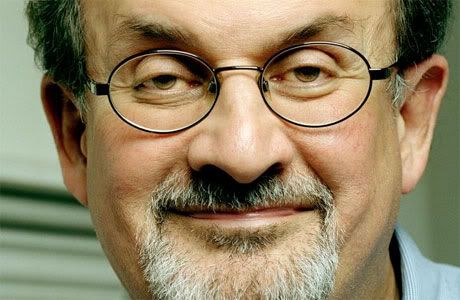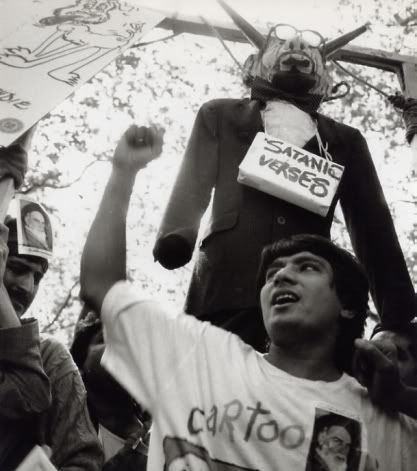Salman Rushdie
 Salman Rushdie spoke last night at Chapman, and Incredible Daughter #1 and I were in the audience. My notes and thoughts:
Salman Rushdie spoke last night at Chapman, and Incredible Daughter #1 and I were in the audience. My notes and thoughts:Rushdie didn't address the interesting pickle he's in, so fitting for a novelist, so worthy of a novel in itself: That his life experience as the target of a fatwah calling for his death makes him thoroughly opposed to censorship, yet his career was made by that same censorship. Would we know of Rushdie were it not for the ten years of hiding he was forced to endure at the hands of the jihadists at the helm of Iran?
Who, by the way, send him a post card once a year, reminding him that the fatwah is still in force.
Fortunately, the world beyond the literary circles does know who Rushdie is, and through him, know what intolerant Islam is capable of.
Rushdie comes off as a playful, witty, intelligent satirist -- his very first words were, "It is great to see so many people turn out to hear a writer ... ... speak."
He talked of novels of the era of Dickens as not just yarns, but news vehicles, designed to create public awareness of some outrage or other of the system, as Nicholas Nickelby did of England's cruel boys schools. Even with the advent of multiple, competing news sources, this function of the novel has not disappeared:
"Looking at what passes for news on media whose business it is to bring us the news, it appears that there's' still a job to be done by the novelist here."Art, he said, is fundamentally opposed to power.
"Both politicians and writers try to offer portraits of the world. The difference is that when writers do this, they say on the cover that it's fiction and they want $20 for it ... well, $12 will do ... $6 on Amazon. Politicians try to convince you it's the truth, and they want it all."With this came, of course, jibes at Bush, as is required from the literary set. A stale WMD joke got a light laugh, but it just made me wonder how this victim of Islamist extremism could so sheepishly baaa with the herd.
There was an anti-American current running under some of his speech, but aside from the Bush jibes it didn't manifest obnoxiously. His perspective of the country as a foreigner is one of "America the powerful:"
"Power tries to fictionalize what is the case and ironically, it falls to fiction to point out what is the truth, even though that's not necessarily what fiction is for.This is anti-Americanism understated, or perhaps not anti-Americanism at all. If the novelist is opposed to power period, yes. If he differentiates between good power and bad power, and plays with the tension between the two, then no. That would be reality through fiction.
"The thing America mostly means to people from outside the U.S. is the power of the country, but remarkably few American writers write about the U.S. as the rest of the world sees it."
Despite this dip into the political, which he did one more time while discussing Joseph Heller's Catch 22, Rushdie said it is not the purpose of novels to carry an agenda.
"The uselessness of literature must be defended. It is completely OK for books to not be useful. Take Alice in Wonderland. It's not thick enough to stand on to reach the top shelf. It's not heavy enough to do damage if you club someone with it, and that is all right."Said another way, via a quote from Saul Bellow:
"We don't have responsibilities, we have inspirations."Part 2. As a man of destiny -- something he turned out to be "pretty good at," but never imagined himself to be until the fatwah -- Rushdie quickly disposed of destiny in the post-9/11 world:
"Your moral character does not necessarily define your destiny as we learned on that terrible day in September, 2001. The people who went to work that day in the World Trade Center and Pentagon did not die because of their moral character."That's not the way Ward Churchill sees it of course, but Churchill is a modest scum of passing consequence. Rushdie, because of his destiny -- whether brought by morality or not, has much more sway than Churchill could ever wish for. Destiny turned him from a man with a routine intellectual-cosmopolitan discomfort with US policies and power into a man with a fearsome appreciation of the power of radical Islam specifically, and blind hatred and censorship more generally.
And this is his conundrum: Made famous by blind hatred and censorship, but having to speak out against it, knowing that it is what he speaks out against that gave him his voice to speak.
 Near the end of the talk, he finally got to what most of us were there for. His theories on literature were interesting, but would not have filled Memorial Hall to full capacity; we wanted to hear his thoughts on the fatwah against him. In telling the story, he struck me as a bit like the aging musician who must always hear the crowd chanting for a song he's played 10,000 times, a song that was very much in his past.
Near the end of the talk, he finally got to what most of us were there for. His theories on literature were interesting, but would not have filled Memorial Hall to full capacity; we wanted to hear his thoughts on the fatwah against him. In telling the story, he struck me as a bit like the aging musician who must always hear the crowd chanting for a song he's played 10,000 times, a song that was very much in his past.Still, he told the story well.
"Had it not been not funny at all, it would have been extremely funny."He told of an interview he saw on TV of a fine looking senior Islamic cleric:
"He was asked, 'Did you read the Satanic Verses?' and replied, 'No, of course not. I do not have to wade in the gutter to see that it contains filth,' and I thought, 'Exactly true ... about gutters!"Then there was the time several years after the fatwah when he met a young British citizen of Islamic origin who confessed to Rushdie that he had been an organizer of demonstrations against the Satanic Verses when he was younger. The guy told Rushdie he'd read the book recently and "can's see what all the fuss is about."
"He was the a**hole who was making all the fuss! But then, no one ever reads the books they are making a fuss about."'Tis true. I fussed a lot about the film Fahrenheit 9/11 but didn't see it after the fuss had died down. In that case, however, I could very much see what all the fuss was about. Still, I'm glad Michael Moore made the film, that it was viewed, and that there was a fuss -- I would never be for banning a book or a film, no matter how vile, unless it was the fruit of pain foisted on unwilling victims, like a book of child pornography.
Rushdie illustrated the concept with the story of a Pakistani film made about him following the fatwah.
"The heroes were all sorts of terrorists, and the villain was me. My character wore the most hideous safari suits and had a mansion in the Philippines, as all novelists do. He was protected by a force that looked suspiciously like the Israeli Mossad, and always had a whip or a saber in one hand and a bottle of Jack Daniels in the other. Drinking Jack Daniels and whipping people -- that's the kind of guy I am."In the end, none of the terrorists succeeded in taking down Rushdie -- that was God's work, striking him down with a massive, swirling Qu'ran falling from heaven.
The movie's producers brought it to England and rented the largest theater in a town with a large Muslim population for its showing. The British government attempted to censor it, but Rushdie wrote them, asking that it be allowed to show.
Show it did -- to a huge, empty auditorium.
"People had heard it was just an awful movie, and even if they wanted to make a political statement, they didn't want to pay $10 and sit through a terrible movie to do it, which is why censorship is such a bad idea.Similarly, he gave credit to the successful crushing of the fatwah against him not to himself, but to "a number of ordinary people -- readers, publishers and book store owners who just decided they were not going to give in."
"If they had banned the film, it would have been famous and people would have watched it on their DVDs behind closed curtains, but it was so bad it couldn't stand the light of day."
"As a result, it was not suppressed. The reason I'm standing here and the book is available is that people said they would not allow this to happen."That was a book. There is a larger thing to fight for: Our Judeo-Christian traditions and the society we've built upon them. I would have liked Rushdie to conclude with that statement, but he defined only a literary battle; he is a novelist in the end, not a champion of a broader action against Islamist totalitarianism.
Labels: Islamism, Literature, Salman Rushdie




<< Home